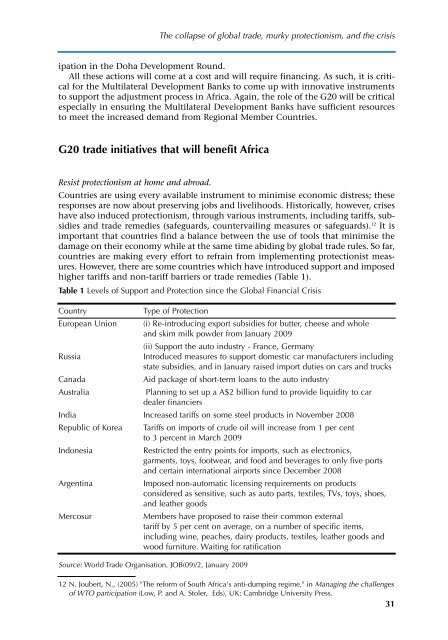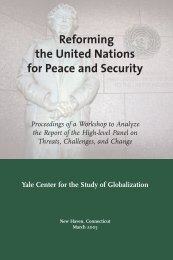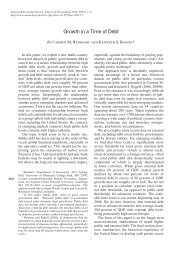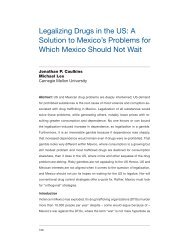The collapse of global trade, murky protectionism, and the crisis:
The collapse of global trade, murky protectionism, and the crisis:
The collapse of global trade, murky protectionism, and the crisis:
Create successful ePaper yourself
Turn your PDF publications into a flip-book with our unique Google optimized e-Paper software.
<strong>The</strong> <strong>collapse</strong> <strong>of</strong> <strong>global</strong> <strong>trade</strong>, <strong>murky</strong> <strong>protectionism</strong>, <strong>and</strong> <strong>the</strong> <strong>crisis</strong><br />
ipation in <strong>the</strong> Doha Development Round.<br />
All <strong>the</strong>se actions will come at a cost <strong>and</strong> will require financing. As such, it is critical<br />
for <strong>the</strong> Multilateral Development Banks to come up with innovative instruments<br />
to support <strong>the</strong> adjustment process in Africa. Again, <strong>the</strong> role <strong>of</strong> <strong>the</strong> G20 will be critical<br />
especially in ensuring <strong>the</strong> Multilateral Development Banks have sufficient resources<br />
to meet <strong>the</strong> increased dem<strong>and</strong> from Regional Member Countries.<br />
G20 <strong>trade</strong> initiatives that will benefit Africa<br />
Resist <strong>protectionism</strong> at home <strong>and</strong> abroad.<br />
Countries are using every available instrument to minimise economic distress; <strong>the</strong>se<br />
responses are now about preserving jobs <strong>and</strong> livelihoods. Historically, however, crises<br />
have also induced <strong>protectionism</strong>, through various instruments, including tariffs, subsidies<br />
<strong>and</strong> <strong>trade</strong> remedies (safeguards, countervailing measures or safeguards). 12 It is<br />
important that countries find a balance between <strong>the</strong> use <strong>of</strong> tools that minimise <strong>the</strong><br />
damage on <strong>the</strong>ir economy while at <strong>the</strong> same time abiding by <strong>global</strong> <strong>trade</strong> rules. So far,<br />
countries are making every effort to refrain from implementing protectionist measures.<br />
However, <strong>the</strong>re are some countries which have introduced support <strong>and</strong> imposed<br />
higher tariffs <strong>and</strong> non-tariff barriers or <strong>trade</strong> remedies (Table 1).<br />
Table 1 Levels <strong>of</strong> Support <strong>and</strong> Protection since <strong>the</strong> Global Financial Crisis<br />
Country<br />
European Union<br />
Russia<br />
Canada<br />
Australia<br />
Type <strong>of</strong> Protection<br />
(i) Re-introducing export subsidies for butter, cheese <strong>and</strong> whole<br />
<strong>and</strong> skim milk powder from January 2009<br />
(ii) Support <strong>the</strong> auto industry - France, Germany<br />
Introduced measures to support domestic car manufacturers including<br />
state subsidies, <strong>and</strong> in January raised import duties on cars <strong>and</strong> trucks<br />
Aid package <strong>of</strong> short-term loans to <strong>the</strong> auto industry<br />
Planning to set up a A$2 billion fund to provide liquidity to car<br />
dealer financiers<br />
India Increased tariffs on some steel products in November 2008<br />
Republic <strong>of</strong> Korea<br />
Indonesia<br />
Argentina<br />
Mercosur<br />
Tariffs on imports <strong>of</strong> crude oil will increase from 1 per cent<br />
to 3 percent in March 2009<br />
Restricted <strong>the</strong> entry points for imports, such as electronics,<br />
garments, toys, footwear, <strong>and</strong> food <strong>and</strong> beverages to only five ports<br />
<strong>and</strong> certain international airports since December 2008<br />
Imposed non-automatic licensing requirements on products<br />
considered as sensitive, such as auto parts, textiles, TVs, toys, shoes,<br />
<strong>and</strong> lea<strong>the</strong>r goods<br />
Members have proposed to raise <strong>the</strong>ir common external<br />
tariff by 5 per cent on average, on a number <strong>of</strong> specific items,<br />
including wine, peaches, dairy products, textiles, lea<strong>the</strong>r goods <strong>and</strong><br />
wood furniture. Waiting for ratification<br />
Source: World Trade Organisation, JOB(09)/2, January 2009<br />
12 N. Joubert, N., (2005) "<strong>The</strong> reform <strong>of</strong> South Africa's anti-dumping regime," in Managing <strong>the</strong> challenges<br />
<strong>of</strong> WTO participation (Low, P. <strong>and</strong> A. Stoler, Eds), UK: Cambridge University Press.<br />
31





